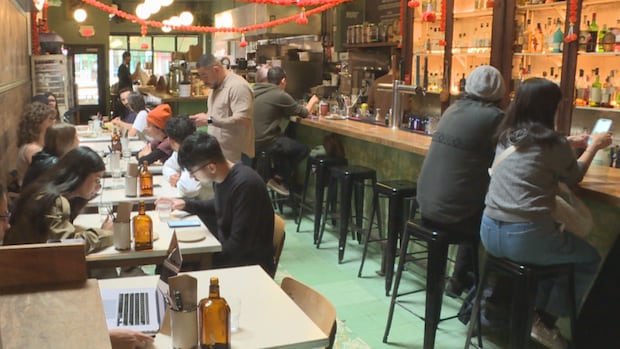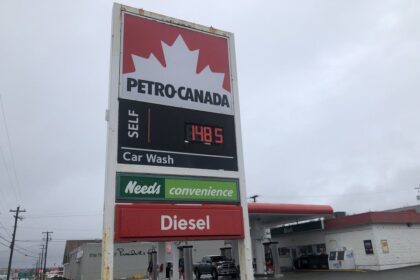British ColumbiaB.C. restaurants and alcohol importers are breathing a sigh of relief as striking B.C. public service workers announced a tentative deal with the province.In B.C., the strike-affected Liquor Distribution Branch is the only way to source alcohol for retail purposesAkshay Kulkarni · CBC News · Posted: Oct 27, 2025 6:55 PM EDT | Last Updated: 6 hours agoListen to this articleEstimated 4 minutesCustomers are seen at Vancouver’s La Mezcaleria restaurant on Oct. 26, 2025. Restaurant operators throughout B.C. are now looking to the potential end of a strike that has impacted their alcohol supply. (Janella Hamilton/CBC)B.C. restaurants and alcohol importers are breathing a sigh of relief as striking public service workers announced a tentative deal with the province on Sunday.The B.C. General Employees’ Union (BCGEU) announced they had reached a mediated deal with the government, nearly eight weeks after a strike began on Sept. 2.One of the more impactful public agencies that was shuttered by the strike was the Liquor Distribution Branch (LDB), the provincial agency responsible for the wholesale distribution and retail sale of alcoholic beverages.Now, even as restaurateurs and alcohol retailers are happy over the strike’s potential resolution, they’re looking to deal with a bumpy start to the holiday season as the alcohol taps come back on.Stacy Kyle with the Import Vintners & Spirits Association said that the backlog created by the strike could last months. (Janella Hamilton/CBC)”I think a relief probably is the first thing,” said Stacy Kyle, executive director of the Import Vintners & Spirits Association, when asked for her reaction to the tentative deal. “Of course, this isn’t a done deal, you know, per se,” she added. “But we’re happy that there’s been some kind of resolution.”Kyle says the strike’s potential end couldn’t have come any faster, as alcohol importers look forward to the holiday season, where she says up to 50 per cent of the entire years’ sales happen.WATCH | How restaurants and retailers coped with strike:Bars, restaurants face liquor shortages during B.C. public service strikeBars and restaurants in British Columbia are worried about liquor shortages as the B.C. General Employees’ Union added additional pickets, including at provincial liquor stores. Bar owners and restaurateurs are only allowed to buy from provincially run stores.But she noted that the last time a BCGEU strike hit the LDB in 2022, a two-week long job action led to alcohol supply backlogs for a couple of months.Ian Tostenson, the CEO of the B.C. Restaurant and Foodservices Association (BCRFA), said his members had to get creative and order directly from local producers over the course of the strike.But now, he says every single retailer and restaurant in the province would start placing orders with the LDB as soon as picket lines came down Monday.”In our view, the system is going to collapse,” he said. “And so we’ve been trying to work with government and the BCGEU to say, look, how do we create a plan that has never been done before in B.C. to resupply this marketplace?”We can’t wait months. It has to be done within weeks because we don’t want to miss, obviously, the holiday season.”WATCH | How local producers benefited from strike:Local distilleries boost direct sales as ongoing strike hits B.C. liquor distributionSome local distilleries are seeing a boom in business as public service workers with the B.C. General Employees Union, including liquor distributors, enter their seventh week of strike action. As Kier Junos reports — some liquor producers are selling more of their products directly to bars, restaurants and liquor stores.In a statement on Monday, the BCRFA said it was co-ordinating 15 large “hospitality hubs” with the LDB to allow restaurants and hospitality operators to buy top-selling spirits, liqueurs and imported wines.The hubs are located at large B.C. Liquor Stores throughout the province. Hospitality operators were encouraged to contact their nearest hub to confirm product availability. The impact of the strike on liquor supply so close to the holiday rush has led to calls for changes to B.C.’s alcohol distribution system.Ignacio Arrieta, co-owner of the La Mezcaleria restaurant in Vancouver, said he ran out of mezcal and came close to running out of tequila over the course of the eight-week-long strike.Ignacio Arrieta, who co-owns La Mezcaleria on Vancouver’s Commercial Drive, said that anyone relying on imported liquor was in dire straits over the course of the strike. (Janella Hamilton/CBC)”Restaurants like mine, where I depend [on] tequila, mezcal and other agave spirits … I cannot sell gin cocktails or, like, vodka cocktails,” he said.”I know that there’s great products, but that’s not my concept.”Arrieta said the government should look at changing the law to allow for restaurants to buy directly from third-party warehouses.”This is [a] situation [where] the government and the union leaders are … just using us as leverage, which is not fair for the restaurant industry, and distributors and producers of liquor.”WATCH | Push for changes to liquor distribution model:B.C. should let restaurants, pubs buy liquor from private stores, alliance saysAs the BCGEU strike wears on, pubs and restaurants are finding themselves in a frustrating situation — while they’re nearly running out of stock, nearby liquor stores are legally barred from selling to them because they’re privately owned. Alliance of Beverage Licensees executive director Bo Chen said the restriction needs to change to give the hospitality industry a better chance of weathering out the strike.With files from Jennifer Magher, Janella Hamilton and Lauren Vanderdeen
B.C. restaurants, alcohol importers relieved over tentative deal in public service strike











